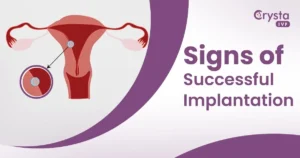Struggling to conceive is challenging as you have to bear the brunt of the entire process, doctor visits, and expectations. While there might not be concrete evidence but for many couples and individuals, infertility can have a significant impact on their mental health.
The stress of dealing with infertility can even lead to depression, anxiety, and feelings of isolation.
The physical and emotional demands of fertility treatments can also be taxing. Many couples struggling with infertility feel like they are on an emotional roller coaster. They may feel hopeful one minute and then feel discouraged the next.
So, how can you take control of your mental health when you’re dealing with infertility?
First, you should understand the psychological aspects of infertility and why some couples give up on their dream of parenthood.
How Is Mental Health Related To Infertility?
If you have been trying to get pregnant for a while, are diagnosed with the condition that could lead to infertility, or have been diagnosed with infertility, you very well understand how challenging infertility can be in routine life and relationships, and, at times, it can be all-consuming.
Infertility can drastically affect your mental health in more than one way. And, it’s not just dealing with infertility. Even the treatments of it sometimes take an emotional toll on many couples.
It’s natural to have mixed emotions during this phase. Emotions you may experience during fertility treatment include:
- Highly irritable
- Depression
- Anxiety
- Psychological stress
- Loneliness
- Feeling of jealousy
- Relationship problems
- Sleep disruptions
- Worthlessness
- Grief
- Social isolation
Studies have shown (Covington, 2015, References therein) that men and women have different ways and methods of dealing with infertility-related problems.
Women tend to seek more moral support from others (friends, family, colleagues) and have sensitive behavior towards triggers (baby showers, birthdays) and data seeking (google, blogs, books).
While men tend to distance themselves from the struggle of infertility altogether (avoidance, not talking about it, humor) and use problem-solving methods (physical steps to try and fix the situation).
Does Mental Stress Impacts Fertility Treatment Outcomes?
The science behind infertility and mental health is not fully known yet, but experts have increasingly suspected that stress & anxiety might also be contributing factors to fertility issues.
In some cases, psychological distress may also lower the chances of conception, even through fertility treatments such as In vitro fertilization (IVF).
Poor Mental Health can affect your fertility health in several ways:-
- A higher level of stress may impact the release of an egg from the ovaries.
- Feeling chronic stress for longer may lead to physiological changes in the body.
- Extreme emotional stress may hamper the functioning of pituitary glands and, thus, reproductive hormone production.
- When the body feels stressed, it may lead to hormonal changes, respiratory changes, and cause cardiovascular.
How To Take Control of Your Mental Health?
Here we have compiled some worth-mentioning ways and techniques to help you deal with mental stress and anxiety related to infertility and treatments or associated procedures.
A. Stay away from Triggers
Do you have a habit of getting triggered easily? Especially after getting diagnosed with infertility?
For couples or women experiencing infertility, the answer is undoubtedly a YES! We fear people questioning us about our plans or dreams of starting a family, and maybe because we are unaware of the answer to when we will be able to achieve our parenthood goals.
It is not always possible to ignore every gathering or social meeting with friends or family as they might trigger your feelings of stress, emotional pain, anxiety, and grief. But, you can avoid attending parties or triggering events like baby shower events or children’s birthday celebrations.
B. Be positive!
Try to be patient! Infertility is not the end of the road, and you will get it through not by being sad but by being optimistic and enjoying the little things.
It’s imperative not to stay in the past and inhabit the past cycles that did not work, and also not to get too far ahead of yourself about future IVF treatments. You should stay in the moment, enjoy the moment you are in, and the magic shall happen soon!
You should stay in the NOW and take smaller steps, like month by month or even smaller steps.
C. Work on stress management
Couples with improved resilience to hardships usually have better ways to deal with resistance, change, and challenges that come their way. One way to effectively do this is to have stress management.
Make sure whatever you are doing to manage stress is healthy. It may include walking in nature, self-medicating, spending time with loved ones, and anything you find relaxing and calming. Stress management is as simple as that.
D. Meditation for mindfulness
It is the aptitude to be fully present in the activity at hand. Naturally, we tend to let our minds roam around, and thoughts usually take over. This can be especially true when stressed, depressed, or extremely anxious.
One way to come out of this is to learn how to manage stress by focusing on meditation and other stress-relieving activities.
E. Eat Healthily
What about choosing a healthy lifestyle & diet? When you eat nutritional food such as whole grains, lean protein, fruits, and veggies, it improves the chances of conception. Healthy food makes your body feel healthy both physically & mentally.
Words From Crysta IVF
Combating infertility is indeed a long process; these things don’t happen overnight. Even if you plan to go for infertility treatments like Intrauterine Inseminations (IUI) or In Vitro Fertilization (IVF), mental peace is required because, many times, outcomes of infertility treatments aren’t that fruitful the way we expect them to be.
The key to managing the mental health impact of infertility is to find ways to cope with the stress. This may involve seeking counseling, talking to friends or family, or joining a support group.
It is also important to remember that infertility does not reflect your worth as a person. You are not alone in this, and there is help available.
Crysta IVF understands the needs and feelings of those struggling to conceive. We offer the best fertility solutions to help them start their families. Our fertility doctors are working tirelessly to help patients deal with the mental stress associated with infertility problems and disorders.
At the end of the day, you must remember that infertility can be treated, and with the help of IVF doctors in Delhi and fertility experts, you can complete your parenthood goals.
Don’t hesitate! Get the right solution on time.




